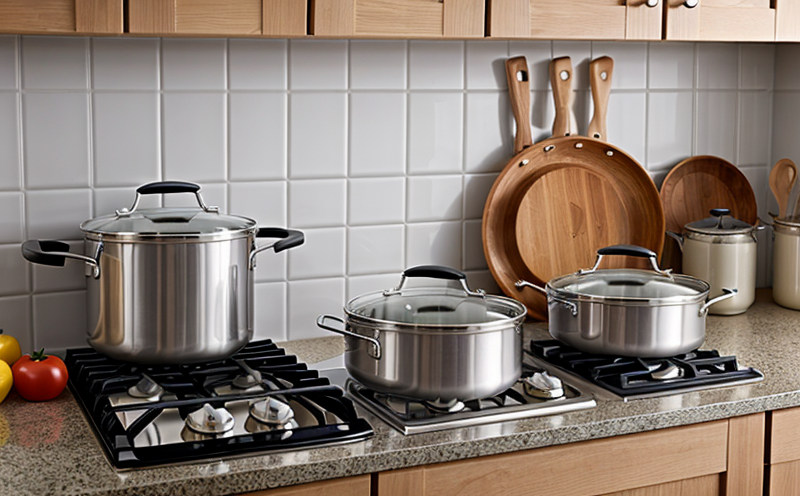RoHS Compliance Testing in Kitchen Appliances and Utensils
The Restriction of Hazardous Substances Directive (RoHS) is a European Union regulation that aims to reduce the environmental impact by restricting certain hazardous substances from use within electronic and electrical equipment. Kitchen appliances and utensils often incorporate components such as circuit boards, plastics, and metals, which can be subject to RoHS compliance requirements.
Compliance with RoHS not only ensures adherence to legal standards but also enhances consumer trust and market access in the European Union. For manufacturers of kitchenware and cookware, ensuring RoHS compliance is crucial for avoiding costly penalties and maintaining a positive brand image. This service provides comprehensive testing solutions to ensure that all materials used meet the stringent requirements set by RoHS.
Our laboratory utilizes state-of-the-art equipment and follows international standards such as EU Directive 2015/863, ensuring accurate and reliable testing results. The testing process includes sample preparation, analysis of hazardous substances like lead (Pb), mercury (Hg), cadmium (Cd), hexavalent chromium (Cr(VI)), polybrominated biphenyls (PBBS), and others.
For R&D engineers and quality managers, understanding the specific components that need to be tested is essential. The following list highlights some of the key materials commonly found in kitchen appliances and utensils:
- PVC plastics
- Copper and brass fittings
- Silicone gaskets
- Electrical connections
The testing process typically involves several steps, including the destruction of samples to isolate the materials for analysis. Once the testing is complete, a detailed report is generated that includes not only the concentrations of hazardous substances but also recommendations for improvement if necessary.
| Test Parameter | Description | Acceptance Criteria |
|---|---|---|
| Pb (Lead) | Detection and quantification of lead content. | <100 ppm |
| Hg (Mercury) | Measurement of mercury levels in the sample. | <10 ppm |
| Cd (Cadmium) | Determination of cadmium content. | <100 ppm |
Our service also offers additional testing options such as ISO/IEC 17025 accreditation, which guarantees the highest level of technical competence and proficiency in conducting tests.
Why It Matters
The importance of RoHS compliance cannot be overstated. In addition to legal requirements, it also ensures product safety and environmental responsibility. By adhering to these standards, manufacturers can:
- Avoid fines and penalties for non-compliance.
- Enhance brand reputation and consumer trust.
- Increase market access in the European Union.
For quality managers and procurement officers, ensuring RoHS compliance is not just a legal requirement but also a strategic business decision. It can lead to improved product performance, reduced risk of recalls, and increased customer satisfaction.
The following table provides an overview of the potential consequences of non-compliance:
| Consequence | Description |
|---|---|
| Fines and Penalties | Financial penalties for non-compliance. |
| Limited Market Access | Banned from selling products in the European Union. |
In conclusion, RoHS compliance is essential for kitchenware and cookware manufacturers to ensure their products meet safety standards and environmental regulations. By partnering with our laboratory, you can rest assured that your products are tested accurately and reliably.
Industry Applications
The application of RoHS compliance testing is widespread across various sectors within the consumer products industry. Kitchen appliances and utensils represent a significant part of this market, where both manufacturers and suppliers must ensure that their products comply with stringent environmental regulations.
- Pan Manufacturers: Ensuring that non-stick coatings do not contain excessive levels of Pb or Cd.
- Toaster Oven Makers: Verifying the safety of electrical components and plastics used in the oven cavity.
The following table highlights some of the key industries where RoHS compliance testing is critical:
| Industry | Description |
|---|---|
| Pan Manufacturing | Ensuring non-stick coatings are safe for food contact. |
| Toaster Oven Manufacturing | Verifying the safety of electrical components and plastics used in the oven cavity. |
In addition to these industries, other sectors such as tableware manufacturers, kitchen gadget producers, and appliance repair services also benefit from RoHS compliance testing. This ensures that all materials used in their products are safe for consumers and the environment.
Use Cases and Application Examples
The use cases for RoHS compliance testing in kitchen appliances and utensils are diverse and varied. Here are some real-world examples of how this service can be applied:
- Material Verification: Testing raw materials to ensure they meet RoHS standards before production.
- Manufacturing Process Monitoring: Regular testing during the manufacturing process to catch any non-compliant materials early on.
The following table provides examples of specific kitchen appliances and utensils that can undergo RoHS compliance testing:
| Kitchen Appliances/Utensils | Description |
|---|---|
| Toaster Ovens | Testing for Pb, Hg, and Cd in the electrical components. |
| Cooking Pots and Pans | Ensuring non-stick coatings meet RoHS requirements. |
In addition to these examples, other kitchen appliances such as blenders, coffee makers, and food processors also benefit from this service. The testing process ensures that all materials used in the production of these products are safe for consumers and comply with RoHS regulations.





